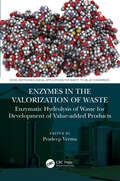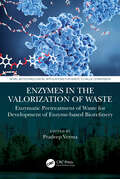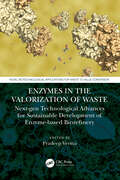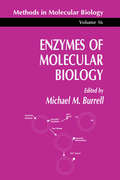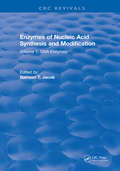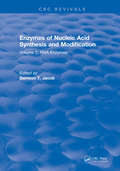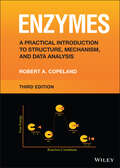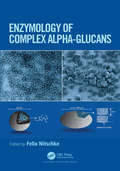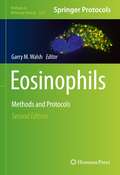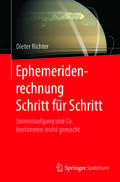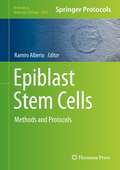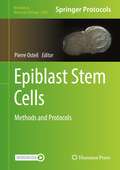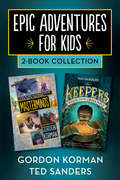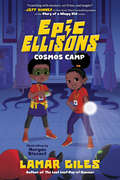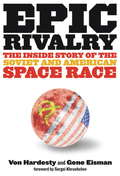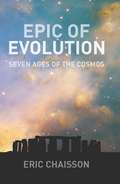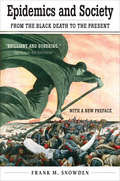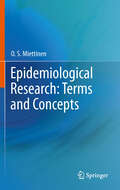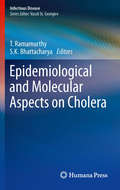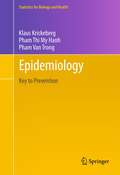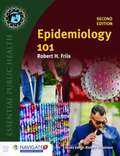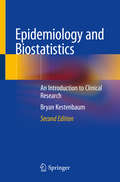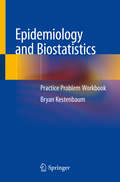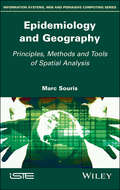- Table View
- List View
Enzymes in the Valorization of Waste: Enzymatic Hydrolysis of Waste for Development of Value-added Products (Novel Biotechnological Applications for Waste to Value Conversion)
by Pradeep VermaEnzymes play a vital role in the enzymatic hydrolysis of waste for its conversion to useful value-added products. Enzymatic Hydrolysis of Waste for Development of Value-added Products focusses on the role of key enzymes such as cellulase, hemicellulases, amylases, and auxiliary enzymes (LMPOs), used in the hydrolysis step of the biorefinery setup. Further, it discusses the role of enzymes in the generation of reducing sugars and value-added compounds, with major emphasis on recent advances in the field. The mechanism, importance, type, evolution, and role of enzymes in hydrolysis constitute the crux of this volume, which is illustrated with examples and pertinent case studies. Features: • Explores the role of hydrolyzing enzymes in the breakdown and transformation of biomass hydrolysis. • Discusses the potential of auxiliary enzymes (LPMOs) for enhancing hydrolysis potential. • Covers recent developments in the field of enzymatic-assisted hydrolysis of waste for conversion of waste to value-added products. • Deliberates all possible products that can be generated from enzymatic hydrolysis of waste and their potential utilization. • Elucidates the limitations and advantages of enzyme-based hydrolysis and possible strategies for moving from the laboratory to large scale industries. This book is aimed at graduate students, researchers and related industry professionals in biochemical engineering, environmental science, wastewater treatment, biotechnology, applied microbiology, biomass-based biorefinery, biochemistry, green chemistry, sustainable development, waste treatment, enzymology, microbial biotechnology, and waste valorization.
Enzymes in the Valorization of Waste: Enzymatic Pretreatment of Waste for Development of Enzyme-based Biorefinery (Novel Biotechnological Applications for Waste to Value Conversion)
by Pradeep Verma"Enzymes in Valorization of waste: Enzymatic pre-treatment of waste for development of enzyme based biorefinery" focusses on the role of key delignifying enzymes (Laccase, MnP, LiP and LPMO’s) involved in biomass pre-treatment. The role of these enzymes such as hemicellulose, chitinases, and pectinases are discussed exhaustively including enzyme assisted recovery of high value phenolic compounds and value-added compounds generated during the pre-treatment process. All chapters cover broad topics and thematic areas associated with the pre-treatment step of biorefinery including enzyme mediated water treatment and its associated applications in biofuels, biorefineries and bioconversion. Features: Highlights mechanistic approach how the enzyme being able to regulate the delignification. Discusses advantages of the enzymatic delignification over other physical and chemical methods. Illustrates role of enzymes such as pectinase and chitinases and breaking down of biomass recalcitrance due to presence of pectin and chitin. Consolidates details on de-lignifying enzymes ((Laccase, MnP, LiP and LPMO’s) suitable in biomass pretreatment. Explores role of delignifying enzymes in high value phenolic compounds recovery during the enzymatic delignification. This book aims at Graduate students, Researchers and related Industry Professionals in Biochemical Engineering, Environmental Science, Wastewater Treatment, Biotechnology, Applied Microbiology, Biomass Based Biorefinery, Biochemistry, Green Chemistry, Sustainable Development, Waste Treatment, Enzymology, Microbial Biotechnology, and Waste Valorization.
Enzymes in the Valorization of Waste: Next-Gen Technological Advances for Sustainable Development of Enzyme based Biorefinery (Novel Biotechnological Applications for Waste to Value Conversion)
by Pradeep VermaEnzymes in the Valorization of Waste: Next-Gen Technological Advances for Sustainable Development of Enzyme-based Biorefinery focusses on key enzymes which are involved in the development of integrated biorefinery. It highlights the modern next-gen technologies for promoting the application of sustainable and greener enzymatic steps at industrial scale for the development of futuristic and self-sustainable "consolidated/integrated biorefinery/enzyme-based biorefinery." It also deals with technological advancement for improvement of enzyme yield or specificity, conversion capability, such as protein and metabolic engineering and advances in next generation technologies, and so forth. Features: • Explores all modern-day technologies that can potentially be used in enzyme-based biorefinery conversion of wastes to value-added products. • Covers technological, economic, and environmental assessments of enzyme-based biorefinery prospects. • Deliberates all possible products that can be generated from wastes including biofuel and essential chemicals. • Illustrates techniques for enhanced yield and properties to be used in various industrial applications. • Reviews advanced information of relevant sources and mechanism of enzymes. This book is aimed at graduate students, researchers and related industry professionals in biochemical engineering, environmental science, wastewater treatment, biotechnology, applied microbiology, biomass-based biorefinery, biochemistry, green chemistry, sustainable development, waste treatment, enzymology, microbial biotechnology, and waste valorization.
Enzymes of Molecular Biology
by Michael M. BurrellProvides key information on a wide range of enzymes commonly used as tools in molecular biology, helping to minimize the time a scientist spends researching the literature to get reactions to work efficiently and allowing the nonenzymologist to design an experiment. Each chapter gives background information on the enzyme selected and those parameters important in its use, describes both the source and application of the enzyme, and provides details on the size and structure of the protein. Specific parameters essential for achieving an optimized reaction are discussed, along with exemplary practical procedures an protocols.
Enzymes of Nucleic Acid Synthesis and Modification: Volume 1: DNA Enzymes
by Samson T. JacobThe First volume gives an overview of the enzymes involved in DNA synthesis and modification; the second volume deals with the RNA-enzymes. Although the major emphasis of the book is on eukaryotic enzymes, a separate chapter dealing with prokaryotic DNA repair enzymes has been included to discuss the major advances in this field in recent years. There are two separate chapters on RNA polymerases to provide a comprehensive coverage of the enzymes from lower eukaryotes, plants and higher eukaryotes.
Enzymes of Nucleic Acid Synthesis and Modification: Volume 2: RNA Enzymes
by Samson T. JacobThe First volume gives an overview of the enzymes involved in DNA synthesis and modification; the second volume deals with the RNA-enzymes. Although the major emphasis of the book is on eukaryotic enzymes, a separate chapter dealing with prokaryotic DNA repair enzymes has been included to discuss the major advances in this field in recent years. There are two separate chapters on RNA polymerases to provide a comprehensive coverage of the enzymes from lower eukaryotes, plants and higher eukaryotes.
Enzymes: A Practical Introduction to Structure, Mechanism, and Data Analysis
by Robert A. CopelandENZYMES A complete and approachable introduction to the study of enzymes, from theory to practice Enzymes catalyze the bulk of important biological processes, both metabolic and biochemical. They are specialized proteins whose function is determined by their structure, understanding which is therefore a key focus of biological, pharmacological, and agrarian research, among many others. A thorough knowledge of enzyme structure, pathways, and mechanisms is a fundamental building block of the life sciences and all others connected to them. Enzymes offers a detailed introduction to this critical subject. It analyzes enzyme proteins at the structural level and details the mechanisms by which they perform their catalyzing functions. The book’s in-depth engagement with primary literature and up-to-date research allows it to continuously deploy illustrative examples and connect readers with further research on key subjects. Fully updated after decades as the standard text, this book unlocks a thriving field of biological and biochemical research. Readers of the third edition of Enzymes will also find: Expanded chapters on steady-state and transient-state enzyme kinetics, structural components of enzymes, and more New chapters on enzyme regulation, enzyme-macromolecule interactions, enzyme evolution, and enzymes in human health Key Learning Points at the beginning of each chapter to assist students and instructors Enzymes promises to continue as the standard reference on this subject for practitioners of the life sciences and related fields in both academia and industry.
Enzymology of Complex Alpha-Glucans
by Felix NitschkeGlycogen and Starch: So Similar, yet so Different. Both carbohydrates are central to the primary metabolism of a large part of the living kingdom. Generally, animals, fungi, and bacteria store glycogen, while plants largely rely on starch. This book provides a broad and current view on both glycogen and starch, in lower and higher organisms. Beside biochemistry, physiology and regulation of glycogen and starch metabolism, the reader can expect an insight into glycogen storage diseases, select methods and relevant techniques. While significant progress has been made in both fields, this volume emphasizes an opportunity of collaboration for researchers working on a major intersection of the living world.
Eosinophils: Methods and Protocols (Methods in Molecular Biology #2241)
by Garry M. WalshThis second edition of Eosinophils: Methods and Protocols updates several techniques from the first edition together with novel in vitro and in vivo-based methodologies. Written by internationally recognized expert authorities, this volume provides vital techniques from eosinophil purification to experimental modelling, with each technique spelled out in clear and straightforward terms, assuming no previous knowledge of the method and without necessitating sourcing additional information elsewhere. Written in the highly successful Methods in Molecular Biology format, chapters include introductions to their respective topics, lists of the essential materials and reagents, step-by-step, readily reproducible laboratory protocols, with tips on troubleshooting and avoiding known pitfalls. Authoritative and practical, Eosinophils: Methods and Protocols, Second Edition provides the practical means to extend our knowledge of eosinophil function in health and disease, underpinning research that may in turn lead to new hypotheses for future examinations into the role of this intriguing and enigmatic leukocyte.
Ephemeridenrechnung Schritt für Schritt: Sonnenaufgang und Co. bestimmen leicht gemacht
by Dieter RichterDas vorliegende Buch vermittelt die Grundkenntnisse der Ephemeridenrechnung. Ausgehend von den Kepler’schen Gesetzen erfolgt die Berechnung der Koordinaten der Planeten in der Bahnebene. Über eine Anzahl von Transformationen ermittelt man die Koordinaten im Horizontsystem und erhält damit die Winkel, die an einem Teleskop einzustellen sind, um einen bestimmten Planeten zu sehen. Dabei werden das Zweikörper- oder Kepler-Problem und die Berechnung weiterer Parameter, wie die Bahngeschwindigkeit und der Abstand der Planeten von der Sonne, geschlossen hergeleitet, ausführlich erklärt und am Beispiel einzelner Planeten vorgerechnet. Ergänzend dazu, und über das Zweikörperproblem hinausgehend, wird die Berechnung der Mondposition erläutert.Außerdem werden die wichtigsten Einflüsse auf die Planetenbahnen, die im Rahmen der Berechnung als Zweikörperproblem nicht berücksichtigt wurden, erklärt und deren Wirkung auf die Planeten abgeschätzt. Zum besseren Verständnis ist eine Reihe von Beispielen beschrieben und vorgerechnet, bei denen die erworbenen Kenntnisse angewendet werden.Das Buch wendet sich an Studierende der Naturwissenschaften, Physik, Astronomie und an Amateurastronomen sowie naturwissenschaftlich Interessierte, die schon immer einmal erfahren wollten, woher man denn weiß, wann die Sonne aufgeht..
Epiblast Stem Cells: Methods and Protocols
by Ramiro AlberioIn Epiblast Stem Cells: Methods and Protocols, expect researchers in the field provide a detailed collection of techniques and protocols useful to the study of the biology of the pluripotent epiblast. These include methods and techniques used to study epiblast development in different amniotes. This collection brings together contributions from the fields of embryology, stem cell biology and developmental biology together, providing a single volume with detailed procedures for the isolation and culture of epiblasts at different stages of development, and techniques for the study of differentiation into specific lineages. Written in the highly successful Methods in Molecular Biology series format, chapters include introductions to their respective topics, a complete list of the necessary materials and reagents, detailed laboratory protocols, and extensive notes providing suggestions on troubleshooting and how to overcome common difficulties. Comprehensive and cutting-edge, Epiblast Stem Cells: Methods and Protocols serves as a resource to individuals interested in studying the biology of pluripotent cells.
Epiblast Stem Cells: Methods and Protocols (Methods in Molecular Biology #2490)
by Pierre OsteilThis book aims to deliver the most up-to-date protocols in using epiblast stem cells (EpiSC) to answer critical questions on mammalian development. Beginning with a section on the spectrum of mouse primed pluripotent stem cells, the volume continues with chapters on toolkits to characterize and study primed stem cells, as well as primed stem cells to engineer gastrulation models. Written for the highly successful Method in Molecular Biology series, chapters include introductions to their respective topics, lists of the necessary materials and reagents, step-by-step, readily reproducible laboratory protocols, and tips on troubleshooting and avoiding known pitfalls. Authoritative and practical, Epiblast Stem Cells: Methods and Protocols serves as an ideal guide to overcome the reproducibility problem by gathering detailed state-of-the-art protocols to perform comprehensive analyses, enabling the reader to opt for the appropriate cell type to model the epiblast.
Epic Adventures for Kids 2-Book Collection
by Gordon Korman Ted SandersHere are two epic, adventure-packed novels for middle grade readers, from #1 New York Times bestselling author Gordon Korman and award-winning author Ted Sanders in his first book for younger readers.Masterminds: Action-packed and full of unexpected twists, this new series from Gordon Korman is perfect for young fans of James Patterson and John Grisham. In idyllic Serenity, New Mexico, honesty and integrity are valued above all else. The thirty kids who live there never lie--they know it's a short leap from that to the awful problems of other, less fortunate places. Then one day Eli Frieden bikes to the edge of the city limits and something so crazy and unexpected happens, it changes everything.The Keepers: The Box and the Dragonfly: Experience the fantastic adventure filled with magical objects, secret sects, and life as we know it on the line! Mixing magic and physics, Ted Sanders has created an epic story that has the feel of classic fantasy but twists it into something new and innovative. When Horace F. Andrews finds the Box of Promises in the curio shop, he quickly discovers that ordinary-looking objects can hold extraordinary power. From the enormous, sinister man shadowing him to the gradual mastery of his newfound abilities to his encounters with Chloe--a girl who has an astonishing talent of her own--Horace follows a path that puts the pair in the middle of a centuries-old conflict between two warring factions in which every decision they make could have disastrous consequences.
Epic Ellisons: Cosmos Camp
by Lamar GilesFrom Edgar Award nominee and WNDB cofounder Lamar Giles, this middle grade adventure stars the Epic Ellison twins as they race to solve the mystery of Cosmos Camp for young geniuses in a stand-alone companion to the Legendary Alston Boys series.School’s out, and Wiki and Leen Ellison are facing a new challenge… their first summer apart! Genius inventor Leen has been accepted to Petey Thunkle’s world-famous summer training program for STEM prodigies with their eyes on the stars. Meanwhile, Wiki is looking forward to her first summer on her own, running the family corn stand and outclassing Otto and Sheed Alston.But the night before Leen’s departure, the twins find out that Wiki has also been accepted into the same camp (even though she didn’t apply). And they are... not thrilled. This summer was never supposed to be a Twin Thing! The situation soon goes from bad to worse—because the Ellisons haven’t been invited just to participate in the program.They’re there to solve a mystery.Someone (or something) has been tampering with the company’s upcoming big-deal rocket launch. Now, the sisters are undercover, dealing with hyper-competitive campers by day and trying to stop the mysterious saboteur by night.All is not as it seems at PeteyTech. There are bigger, badder forces at play than the girls could’ve imagined. And if Wiki and Leen don’t get their act together fast, their first epic adventure away from Logan County could end up an epic fail... for the entire world.
Epic Rivalry: The Inside Story of the Soviet and American Space Race
by Gene Eisman Von HardestyWhen Neil Armstrong and Buzz Aldrin walked on the moon in 1969, they personified an almost unimaginable feat-the incredibly complex task of sending humans safely to another celestial body. This extraordinary odyssey, which grew from the rivalry between the United States and the Soviet Union during the Cold War, was galvanized by the Sputnik launch in 1957. To mark the fiftieth anniversary of Sputnik, National Geographic recaptures this gripping moment in the human experience with a lively and compelling new account. Written by Smithsonian curator Von Hardesty and researcher Gene Eisman, Epic Rivalry tells the story from both the American and the Russian points of view, and shows how each space-faring nation played a vital role in stimulating the work of the other. Scores of rare, unpublished, and powerful photographs recall the urgency and technical creativity of both nations' efforts. The authors recreate in vivid detail the "parallel universes" of the two space exploration programs, with visionaries Wernher von Braun and Sergei Korolev and political leaders John F. Kennedy and Nikita Khrushchev at the epicenters. The conflict between countries, and the tense drama of their independent progress, unfolds in vivid prose. Approaching its subject from a uniquely balanced perspective, this important new narrative chronicles the epic race to the moon and back as it has never been told before-and captures the interest of casual browsers and science, space, and history enthusiasts alike.
Epic of Evolution: Seven Ages of the Cosmos
by Eric ChaissonIn this enthralling and illuminating book, Eric Chaisson, author of the classic work Cosmic Dawn, synthesizes current scientific thinking regarding the origin and evolution of the universe. How did everything around us-the air, the land, the sea, and the stars-come to be? What is the source of order, form, and structure characterizing all material things? Drawing on recent breakthroughs in astrophysics and biochemistry, Chaisson explores the development of the most microscopic and the most immense aspects of our universe, including the idea that all objects-from quarks and quasars to microbes and minds-are interrelated. Epic of Evolution is a stunning view of how various changes, operating across almost incomprehensible domains of space and nearly inconceivable stretches of time-all by means of the cosmic evolutionary combination of chance and necessity-have given rise to our galaxy, our star, our planet, and ourselves.
Epic of Evolution: Seven Ages of the Cosmos
by Eric ChaissonHow did everything around us-the air, the land, the sea, and the stars-originate? What is the source of order, form, and structure characterizing all material things? These are just some of the grand scientific questions Eric J. Chaisson, author of the classic work Cosmic Dawn, explores in his enthralling and illuminating history of the universe. Explaining new discoveries and a range of cutting-edge ideas and theories, Chaisson provides a creative and coherent synthesis of current scientific thinking on the universe's beginnings. He takes us on a tour of the seven ages of the cosmos, from the formless era of radiation through the origins of human culture. Along the way he examines the development of the most microscopic and the most immense aspects of our universe and the complex ways in which they interact. Drawing on recent breakthroughs in astrophysics and biochemistry, Chaisson discusses the contemporary scientific view that all objects-from quarks and quasars to microbes and the human mind-are interrelated. Researchers in all the natural sciences are beginning to identify an underlying pattern penetrating the fabric of existence-a sweepingly encompassing view of the formation, structure, and function of all objects in our multitudinous universe. Moreover, as Chaisson demonstrates, by deciphering the scenario of cosmic evolution, scientists can also determine how living organisms managed to inhabit the land, generate language, and create culture.Epic of Evolution offers a stunning view of how various changes, operating across almost incomprehensible domains of space and nearly inconceivable stretches of time and through the evolutionary combination of necessity and chance, have given rise to our galaxy, our star, our planet, and ourselves.
Epidemics and Society: From the Black Death to the Present (The Open Yale Courses Series)
by Frank M. SnowdenA wide-ranging study that illuminates the connection between epidemic diseases and societal change, from the Black Death to Ebola This sweeping exploration of the impact of epidemic diseases looks at how mass infectious outbreaks have shaped society, from the Black Death to today. In a clear and accessible style, Frank M. Snowden reveals the ways that diseases have not only influenced medical science and public health, but also transformed the arts, religion, intellectual history, and warfare. A multidisciplinary and comparative investigation of the medical and social history of the major epidemics, this volume touches on themes such as the evolution of medical therapy, plague literature, poverty, the environment, and mass hysteria. In addition to providing historical perspective on diseases such as smallpox, cholera, and tuberculosis, Snowden examines the fallout from recent epidemics such as HIV/AIDS, SARS, and Ebola and the question of the world’s preparedness for the next generation of diseases.
Epidemiological Research: Terms and Concepts
by O. S. MiettinenThis book addresses clinical and epidemiological topics of medicine and statistics; then topics of epidemiological research and finally,'meta-epidemiological' clinical research. The author offers a wealth of expertise acquired in a 50-year career in the field.
Epidemiological and Molecular Aspects on Cholera
by S. K. Bhattacharya T. RamamurthyThough cholera is an ancient disease, its perennial occurrence in several parts of the world has attracted many researches to find ways and means to combat the disease. The prevailing seventh pandemic cholera is dominating since 1961, but the dimension of the disease has taken several silhouettes, as the genetic structure and functions of the Vibrio cholerae has changed to a great extent. Several recent studies have shown that transformation of the pathogen at the molecular level has ameliorated several cholera outbreaks and epidemics of with successive new clones of V. cholerae. This comprehensive compilation, written by eminent international researchers reviews the epidemiology of cholera in Africa, Asia, Russia and Latin Americas. The other chapters contributed by acclaimed authors cover various aspects on evolution, polysaccaharide biosynthesis, SXT element, integrons, small molecule signalling systems, flagellar synthesis, filamentous phages, pathogenic role of proteases and hemolysin, and other putative virulence factors. In addition, ecology of V. cholerae and management of cholera were also discussed in detail. This book will be good source of information to all researchers with interests in infectious diseases, microbiology and molecular biology.
Epidemiology
by Klaus Krickeberg Thi My Pham Van Trong PhamThis book is meant for adoption in first courses on epidemiology in Medical Schools and Faculties of Public Health in developing and transition countries and in workshops in these countries, taught for example by members of international organizations. It is also suitable for parallel or second reading within curricula in developed countries and for teaching epidemiology in a Master's programme on "International Health". The book will enable any lecturer to compose his or her introductory courses on epidemiology by selecting the material deemed appropriate. It will provide a solid foundation for more advanced teaching. The intended readership consists in the first place of general medical students; students following the programme "Preventive Physician" that runs parallel to general medical studies in some countries; students starting to specialize in Public Health; and lecturers in epidemiology. The book can also serve well as an introduction into epidemiology for anybody else interested in this field, for example staff of health institutions. Examples and practical work are taken from the present situation of health in Vietnam, which can easily be adapted to any other developing or transition country.
Epidemiology 101 Second Edition
by Robert H. FriisThis best-selling text will introduce you to the basics of infectious disease epidemiology, environmental epidemiology, molecular epidemiology, and psychosocial/behavioral epidemiology. Perfect for those with no prior familiarity with health-related fields or statistics, Epidemiology 101, Second Edition, uses a clear, cohesive writing style and follows the basic Epidemiology 101 curriculum framework as outlined in the AAC&U and APTR Recommendations for Undergraduate Public Health Education. End-of-chapter exercises provide access to a laboratory component for college science courses that require a laboratory.
Epidemiology and Biostatistics: An Introduction to Clinical Research
by Bryan KestenbaumThis is a concise introduction to epidemiology and biostatistics written specifically for medical students and first-time learners of clinical research methods. It presents the core concepts of epidemiology and of biostatistics and illustrates them with extensive examples from the clinical literature. It is the only book on the market written to speak directly to medical students and first-time biomedical researchers by using language and examples that are easy to understand. This newly updated second edition is extensively rewritten to provide the clearest explanations and examples. There is also a sister-text, a 150-problem workbook of practice problems that can be purchased alongside this textbook. The author continues to provide a text that is attractively fast-paced and concise for use in condensed courses, such as those taught in medical school. The book is an excellent review for the epidemiology section of the United States Medical Licensing Examination Part I which all medical students must take at the end of the second year.
Epidemiology and Biostatistics: Practice Problem Workbook
by Bryan KestenbaumThis workbook is designed to teach the major fundamental concepts in Epidemiology, Biostatistics, and clinical research design alongside the textbook "Epidemiology and Biostatistics, 2nd Edition". It is written in concise and organized fashion with many examples to illustrate the concepts deriving from a collection of written materials created to teach Epidemiology and Biostatistics to medical students. The major differences from related titles include a “story” based approach toward teaching the material, relative brevity while maintaining focus on key concepts, and taking the perspective of first-time learners (avoiding and/or clearly defining jargon, using clear common-sense language). It features a variety of questions: long, short, and multiple choice questions. The workbook is made to provide students with the tools necessary to form their own informed conclusions from the clinical research literature.
Epidemiology and Geography: Principles, Methods and Tools of Spatial Analysis
by Marc SourisLocalization is involved everywhere in epidemiology: health phenomena often involve spatial relationships among individuals and risk factors related to geography and environment. Therefore, the use of localization in the analysis and comprehension of health phenomena is essential. This book describes the objectives, principles, methods and tools of spatial analysis and geographic information systems applied to the field of health, and more specifically to the study of the spatial distribution of disease and health–environment relationships. It is a practical introduction to spatial and spatio-temporal analysis for epidemiology and health geography, and takes an educational approach illustrated with real-world examples.Epidemiology and Geography presents a complete and straightforward overview of the use of spatial analysis in epidemiology for students, public health professionals, epidemiologists, health geographers and specialists in health–environment studies.
